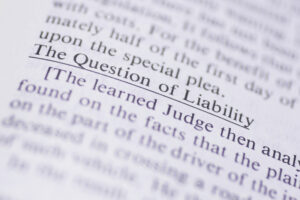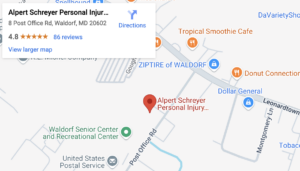
If someone has liability after an accident, this means that they are responsible for the damages they cause. For instance, imagine you are hurt in a car accident. The at-fault party may be liable for property damage and any injuries resulting from the accident.
Maryland law recognizes several different types of liability, depending on the situation and facts of the case. Keep reading below to learn more about liability in Prince George’s County personal injury claims.
What Kind of Damages Are Available to Accident Victims?

Once liability has been established, damages must be determined. There are a few types of damages that accident victims may be able to recover. They include:
- Economic damages: These compensate victims for their financial losses, such as medical bills, lost wages, or property damage.
- Non-economic damages: These damages compensate victims for the pain and suffering they had to endure after an accident.
- Punitive damages: These damages are available only in rare cases and are used to punish the wrongdoer for their behavior.
The specific damages available and the value of those them will vary depending on the specific facts of the case.
Liability for Intentional Acts
An intentional tort is a wrongful act committed with the intent to harm another person.
Some common examples of intentional acts that may result in civil liability include:
- Assault
- Battery
- False imprisonment
- Trespass
- Intentional infliction of emotional distress
Individuals who engage in this type of conduct may also be subject to criminal charges.
Additionally, punitive damages may be available in cases involving liability for intentional conduct. Punitive damages may be awarded if the victim can show clear and convincing evidence that the wrongdoer acted with actual malice. In Maryland, there is no cap on the amount of punitive damages that may be awarded.
Liability in Negligence Claims
Most personal injury cases involve a claim of negligence. This is the legal theory upon which liability is established in the majority of personal injury claims, such as car accidents, truck accidents, slip and fall accidents, and more. To establish liability in a negligence claim, you must prove:
- Duty of care: You must show that the defendant owed you a legal obligation to behave in a reasonable manner in the situation.
- Breach of duty: The defendant failed to act reasonably, thus they breached their legal duty owed to you.
- Causation: The defendant’s actions must have been both the direct and proximate cause of your injuries.
- Damages: You must have suffered some actual losses, such as physical injuries, medical bills, lost wages, etc.
You must prove all four of the above elements to win a negligence case. Failure to prove any one of them can cause you to lose your case.
What Is Strict Liability?
Strict liability puts responsibility on a defendant even when no negligence or carelessness was present. Simply by engaging in certain activities, a defendant must take responsibility for any damages or injuries resulting from their actions. Strict liability exists in several scenarios in Maryland, including:
Ultrahazardous Activities
Some activities are extremely dangerous by their very nature. When someone engages in these types of activities, they can be held liable for any damages that result. For example, companies that engage in blasting activities are often liable for any damage they cause.
Dog Bites
Dog owners are generally strictly liable for any injuries caused by their dogs if their dogs bite someone. Maryland does not follow the “one free bite” rule. Instead, owners can be held liable even if the dog has no history of biting or aggression.
Product Liability
Manufacturers, distributors, and retailers can be held strictly liable for defective products. This means that no negligence is required. Simply putting a defective product into the chain of commerce is enough to hold these entities liable for damages resulting from their use.
Vicarious Liability
Vicarious liability applies in situations where one party may be held responsible for the actions of another. For instance, parents are sometimes responsible for damages caused by their children. Similarly, an employer can be held liable for damages caused by one of their employees. Liability extends from one party to another due to the relationship between the two.
Contact a Prince George’s County Personal Injury Lawyer for a Free Consultation
Establishing liability is crucial to winning your personal injury case and getting compensation for your damages. An experienced personal injury lawyer can help you gather all the evidence necessary to prove your claim.
Contact the team at Alpert Schreyer Personal Injury Lawyers today to let us help you establish liability in your claim and recover the compensation you deserve. Call us now to schedule a free consultation with a personal injury lawyer in Prince George’s County.


